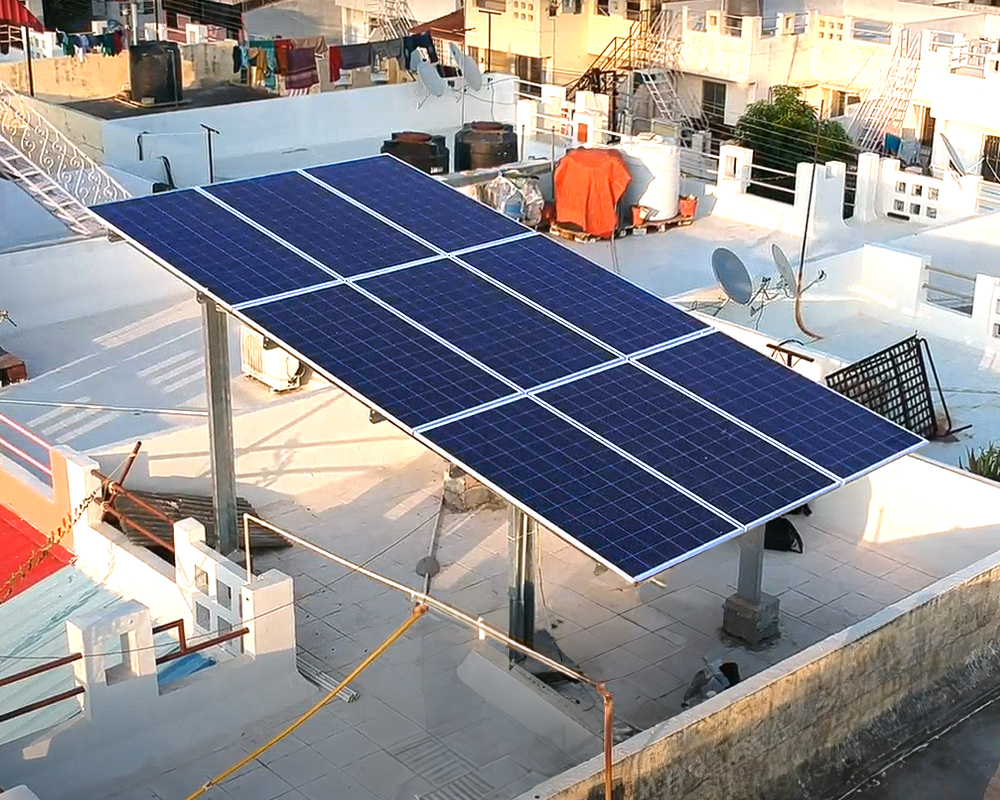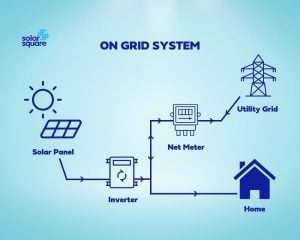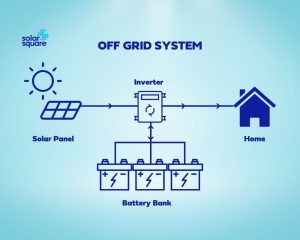
The need for an on-grid and off-grid solar system arose due to two main issues:
- The increasing cost of commercial electricity.
- The harmful effects of fossil-fuel-based electricity on the environment.
People started looking for better options; hence, the wide-scale use of solar systems to generate electricity became popular.
Moreover, high-efficiency solar panels facilitate the production of electricity to power the industrial sector as well.
However, to choose the best solar energy generation system, it is crucial to know the differences between an on-grid and off-grid solar system.
Although solar system installers provide the necessary guidance to select the ideal option for your power requirements, it is always better to do some research on your own.
If you want to know the critical aspects of these two solar systems, you have come to the right place. Let us dive deep into understanding both of these models in detail.
What Is an On-Grid Solar System?

The on-grid solar system is also referred to as a grid-tied system.
It can produce surplus electricity that can meet the energy requirements of not just the residential sector but also the commercial and industrial sectors.
The first basic requirement of installing this system is the presence of a grid. Out of the units that solar panels produce during the day, whatever is not being consumed is transferred to the grid.
The transferred units are imported from the grid at night. And here’s the brownie point: if the solar panels don’t produce enough electricity due to unfavourable conditions on a certain day, the consumer can use the power from the grid.
So, no matter the scenario, your house gets electricity. Also, this system does not require a battery. Your grid is your battery!
What Is An Off-Grid Solar System?

An off-grid solar system functions independently. People don’t need to connect solar panels to any grid. However, this system requires a battery backup to store the solar power generated during the day.
The off-grid solar system consists of solar panels, a charge controller, a battery, mounting structures, and an inverter. The solar panels capture sufficient sunlight during sunshine hours and the battery stores excess charge to power all the electrical appliances at night.
This system is self-sustaining and ideal for areas with no power grids.
4 Key differences between an On-Grid And Off-Grid Solar System
1. On-Grid And Off-Grid Solar System in terms of Power Access
Off-grid
One of the major differences between the on-grid and off-grid solar system is their power access.
If you install an off-grid solar system, you will entirely depend on solar energy to meet your power requirements.
In this system, customers can get sufficient electric current only in the following situations:
- The solar battery attached to the solar system stores excess power during peak hours of the day.
- There’s a continuous supply of power from the solar system during the daytime.
If you do not install batteries or other power storage systems to an off-grid solar system, you will have zero energy supply during the nighttime.
On-grid
A grid-tied solar system enables a continuous power supply irrespective of time and weather conditions. Moreover, you don’t need a battery or storage system to get a regular power supply.
In this system, you can also power your home appliances from commercial electricity via the grid. Thus, you will always have sufficient power for your daily needs.
2. On-Grid And Off-Grid Solar System in terms of a Power Outage
Off-grid
If we compare on-grid and off-grid solar system in terms of power outages, off-grid seems more beneficial. Since this system operates independently, it does not get affected due to power cuts.
In case of a storm or other conditions that result in a power cut, the off-grid panels continue to function.
On-grid
Although an on-grid power system provides sufficient power every time of the day and night, you will have power outages if the grid goes down.
If you want to avoid such situations, you can buy a battery bank. This system is known as a hybrid system.
3. On-grid and off-grid solar system in terms of Power Generation
Off-grid
An off-grid system produces electricity according to the sunlight it receives throughout the day.
During noon time, when the sun rays have maximum intensity, the system produces surplus electricity. You need the proper equipment to make appropriate use of this excessive power.
The off-grid systems produce extra electricity during the day to provide sufficient power when it gets dark. Therefore, it is crucial to have powerful batteries to store the energy being produced.
On-grid
Similar to an off-grid system, a grid-tied solar system also produces excess power when solar cells receive enormous amounts of sunlight during sunshine hours.
However, in this system, the surplus power is transferred to the commercial grid. A bi-directional meter keeps a record of the units generated and consumed.
In this system, there is no requirement for a battery backup. It uses a net metering system which compensates the user’s account for the amount of surplus power transferred to the grid. It ensures that the customers pay only for the extra units they use from the grid.
4. On-grid and off-grid solar system in terms of Electricity Bill
Off-grid
If you look at the electricity bill for an off-grid system, you will notice that a house gets power supply only through solar panels. Hence, consumers don’t have to pay anything.
The components like solar panels, storage batteries, inverters, etc., fulfill all the energy requirements. Therefore, with a one-time investment in a high-efficiency off-grid solar system, you can save yourself from paying monthly electricity bills.
On-grid
In a grid-tied system, you have to pay a minimal charge. The discom replaces the normal meter with a net meter, and the meter charges have to be paid.
Despite these few bits, there are many benefits of installing an on-grid solar system.
On-Grid And Off-Grid Solar System: Which One To Choose?
So, here comes the real question! Which solar system is better among the two?
Solar power systems offer a clean and sustainable source of energy. However, you need to figure out your purpose for installing a solar panel to choose between an on-grid and off-grid solar system.
Both systems have certain benefits and limitations. While an on-grid system is comparatively less costly, it depends on the commercial grid for an uninterrupted power supply.
In contrast, an off-grid system is self-sustaining, but it requires huge investment and space. The batteries have to be very powerful so that they can store enough energy to keep the electricity running even at night.
In case the battery exhausts or there’s not enough sunlight, you might be left with no power supply.
Conclusion
We hope that we were able to answer all of your questions about the on-grid and off-grid solar systems. The best way to understand which of the two is better depends upon your requirements. However, most states and cities in India that have a commercial grid count on the on-grid solar system only.
FAQs
Q. Can I get a power supply from an off-grid solar plant at night?
An off-grid solar system generates power during the day and stores the surplus in the storage battery.
During the night, you can use the power from the battery to run appliances of your home or business.
Q. Which is a better option between on-grid and off-grid systems if there is insufficient space to install solar panels?
In case you have limited space to install multiple solar panels to generate electricity, you must consider getting an on-grid solar system for a sufficient power supply.
Q. Can an off-grid system run without storage batteries?
Yes, an off-grid system can run without batteries. However, you can get a power supply only when the solar panels receive sufficient sunlight during the day.
During the night (and unfavourable weather conditions), you won’t get electricity.
